2024 Genesis G70 3.3T Sport
| The Good: – Ride and handling – Very good power – Unique exterior styling |
The Bad: – Limited rear legroom – Some ergonomics issues – Unchanged interior styling |
The Genesis G70 has been in the game for only a generation so far, playing in a category dominated by the BMW 3-Series, at least in terms of street rep. It has undergone a facelift in that time, taking on a very unique corporate style that has yet to be diluted by copycats.
Whereas the pre-facelift G70 looked cluttered from the front and derivative from every other angle, the latest one changes those details to create a clean look with futuristic wraparound “strip” lighting. The car is a bit of a head-turner as Genesis remains a bit of a rarity on Middle East roads.
It looks especially good in this top-spec 3.3T Sport trim with its 19-inch smoked wheels, darkened trim and dual exhaust cutouts in the rear bumper, although we’ve yet to see a 2.0T base model, which looks largely the same but with different wheels and single-side exhaust outlets. Our stealthy test car had satin-matte grey paint, which we wouldn’t recommend because it attracts scratches from road debris rather easily. Pick a nice shiny bright colour.

Inside, the dash styling has been largely left untouched, still with that odd void below the a/c controls, but it’s easy to appreciate because it is trimmed with premium materials. There is red-stitched leather, soft-touch surfaces and aluminium pieces all over the upper half of the cabin, as well as little details such as burled metal trim around the cup-holders, even in the back. However, the cup-holders do not have covers, although the cubby in the centre-console does. Hard plastics are relegated to the door pockets and the sides of the gear-shifter console.
The top-spec model gets sporty seats with good bolstering and quilted Nappa leather upholstery. Space up front is great, while headroom is good both front and back. However, rear-passenger space is limited by lack of foot room, which makes entry-exit tight as well. Rear knee-room is fine though, while room can be made for the toes by raising the front seats, assuming the front passengers agree. The rear middle seat is compromised by a raised transmission tunnel.
The boot is pretty big, even with a full-size spare wheel underneath, with split-folding rear seats that makes it a practical cargo hauler.
Updated tech features shore up well among other offerings in the entry-level premium class, with the 3.3T coming with LED headlights and tails, a heads-up display, an amazing 12.3-inch “3D” LCD instrumentation screen, standard cooled memory front seats with bottom extensions and electrically-adjusted side bolsters that tighten up in “sport” mode, smart keyless entry and start, pretty decent dual-zone auto a/c with rear vents, electric parking brake, 15-speaker Lexicon stereo with Bluetooth/USB/Apply Carplay, and a 10.25-inch navigation/multimedia touchscreen. Most other premium brands offer less standard features at the same price point.
There are a couple of ergonomics issues. The central touchscreen is sat on the top of the dash, so reaching the furthest part of the screen requires stretching your arm a bit. Also, the automatic gear-selector functions through Reverse, Neutral and Drive in the traditional way, but Park is a separate button next to the shifter.
Aside from 10 airbags, all-round parking sensors with around-view cameras, ABS and ESP, the top G70 also comes with a full suite of active safety features, such as forward/blind-spot collision avoidance assist, smart cruise control and stop, driver attention warning and Hyundai’s sweet blind-spot view monitor, among several others. There is also lane departure warning and lane-keeping assist, where the steering wheel vibrates as a warning and tugs itself back into lane if you get too close to the lane markings without indicating.

Powered by a 3.3-litre turbocharged direct-injected V6, the G70 3.3T makes 365 hp at 6000 rpm and 510 Nm of torque from 1300 to 4500 rpm. That’s good enough to launch the car from zero to 100 kph in 5.5 seconds, as tested with the pre-facelift model. It’s not the quickest or most powerful in its class, but it’s plenty quick for a street vehicle.
The V6’s fuel consumption is about as expected, at 13.3 litres/100 km. For economy-minded folks, there is also a new-for-2024 300 hp 2.0T rear-wheel-drive model positioned below the all-wheel-drive Sport model we tested.
The G70 3.3T drives like a sport sedan should. With several driving modes from economical to sporty, the G70 offers responsive controls and a smooth 8-speed automatic that picks all the right gears, unlike Hyundai’s previously-awful 8-speed gearboxes. Even the paddle-shifters respond well, and there’s very little turbo lag to speak of.
Pushing its limits is as, with a well-weighted variable-ratio steering that actually offers some feedback. There’s great grip from the front and rear tyres, with very high limits.
On corners, it offers neutral handling for the most part, going into mild understeer on sharper curves, but it can be coaxed into mild oversteer mid-way in the turn, with the rear-biased all-wheel-drive system allowing for such adjustability better than many other AWD sedans.
The standard Brembo brakes offer fairly good stopping power with a linear and meaty pedal feel.
As for the ride, the 3.3T version comes with adaptive suspension, and while it’s slightly firm due to the low-profile tyres, it takes severe bumps very well, with no floatiness over uneven surfaces. It’s also fairly quiet, with a constant hush at 120 kph and minimal road noise. There is a muffled, grunty engine note played through the speakers when the throttle is applied.
The Genesis G70 offers great value for money for an entertaining sports sedan that drives better than all the second-tier luxury brands and is nipping at the heels of the German stalwarts. The company’s march towards becoming a credible luxury brand is in full swing.
Photos by Mashfique Hussain Chowdhury
| Price Range: Dh 195,000-204,000 Current Model Introduced in: Body Styles: Engines: Transmissions: Setup: Suspension: |
Brakes: Front: discs Rear: discs Curb Weight: Length: Wheelbase: Top Speed: Test Acceleration 0-100 kph: Observed Test Fuel Economy: |






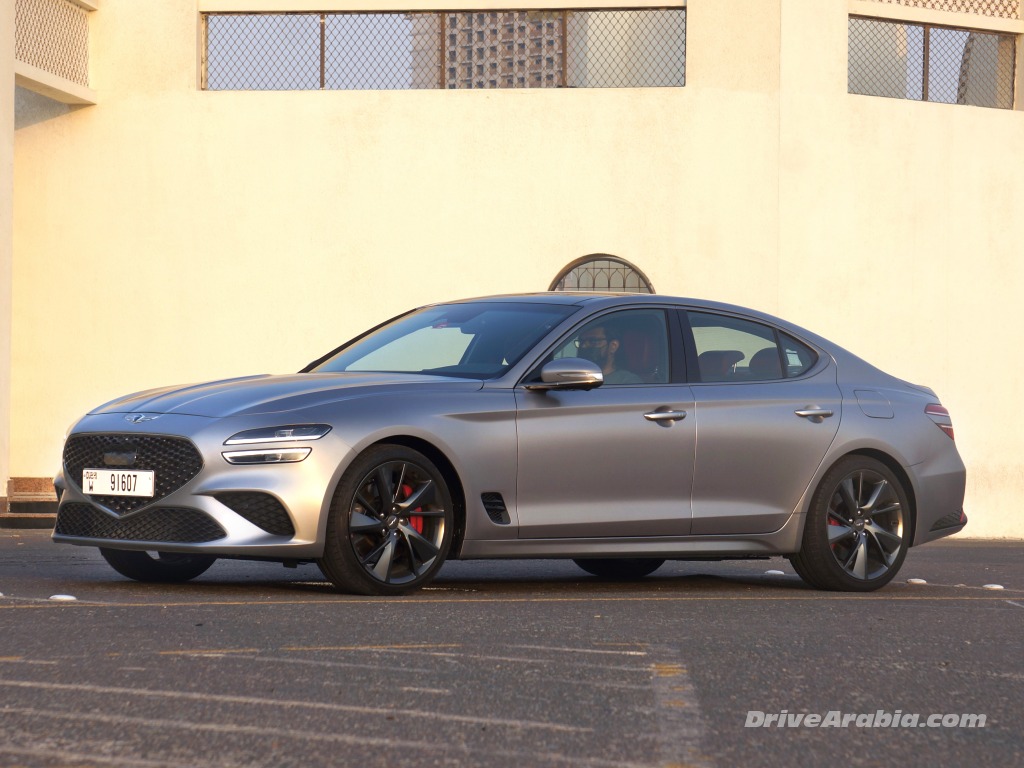
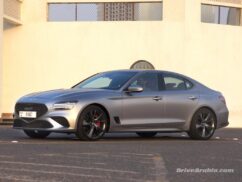
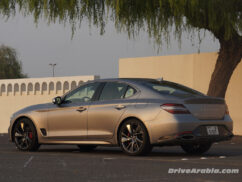
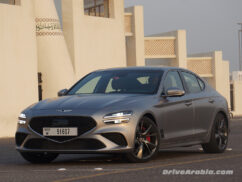
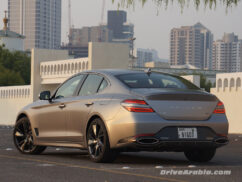
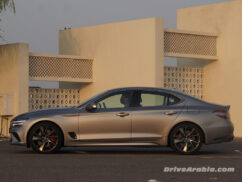
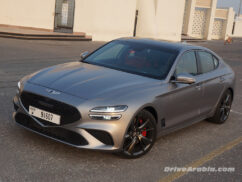
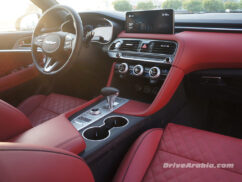
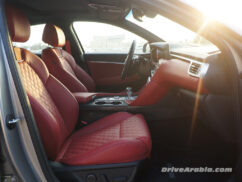
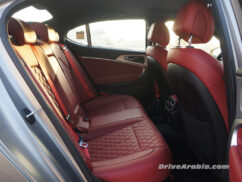
There are no comments. Be the first!